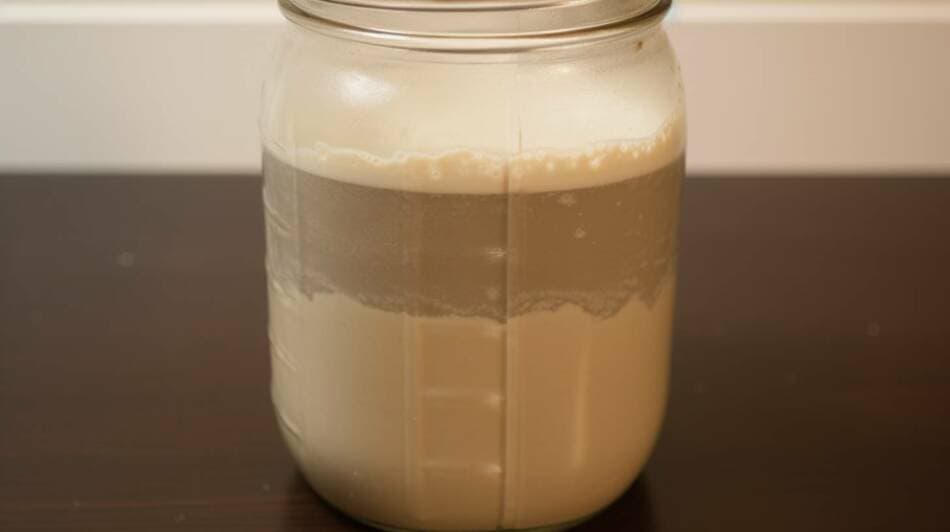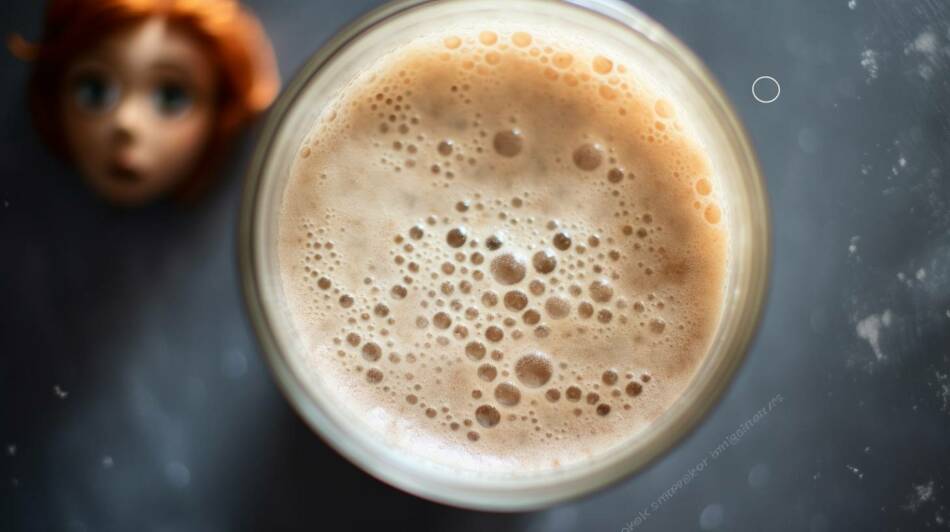The distinctive alcoholic scent emanating from your sourdough starter isn’t accidental or an anomaly. In essence, this aroma stems directly from the process of fermentation. At the core of a sourdough starter is a harmonious blend of wild yeast and lactic acid bacteria.
As these microorganisms feast on the rich carbohydrates present in the flour, they embark on a metabolic journey, releasing a medley of byproducts. One of the standout byproducts from this biological concert is ethanol, commonly known as alcohol.
A strong alcoholic smell in your sourdough starter is due to active fermentation, where yeast produces ethanol as a byproduct. This aroma intensifies if the starter isn’t fed regularly, is kept in warmer conditions, or has exhausted its food supply, leading to increased alcohol production. Regular feeding can help mitigate this.
1. Reasons for the Strong Alcohol Smell
a) Extended Fermentation Time

There’s a delicate balance to maintain when it comes to feeding your starter. Neglecting its nutritional needs and allowing it to sit for prolonged intervals without fresh flour can trigger a survival response. Starved of its regular carbohydrate sources, the yeast and bacteria delve deeper, producing increased amounts of alcohol, which manifests as that potent smell.
b) Warm Temperatures
Every organism has its preferred temperature range for optimal activity, and yeast is no different. In the cozy embrace of warmer temperatures, yeast undergoes a metabolic boost, surging in its fermentation activities. A starter kept in such conditions is akin to putting it on fast-forward, resulting in quicker alcohol production than in its cooler counterparts.
2. Is the Alcohol Smell a Bad Sign?
Not necessarily. In fact, a gentle hint of alcohol is a testament to the lively fermentation dance occurring within your jar, a sign that the microorganisms are diligently at work. This scent is particularly prominent if your starter has been biding its time without a recent meal of fresh flour and water.
However, like all things in life, balance is key. Should this alcoholic fragrance morph into an intense, overwhelming aroma or, worse, be joined by other unpleasant or moldy smells, it’s an alert. Such changes can be indicative of an imbalance in the microbial ecosystem of your starter, signaling that some intervention may be needed to restore its health and vitality.
3. What to Do When Your Starter Smells Like Alcohol
a) Feed It
At its heart, the alcoholic scent is a cry for nourishment. Attending to this call requires a simple act: feeding your starter. By discarding a portion of the over-fermented starter and introducing fresh flour and water, you rejuvenate its micro-environment. This not only bolsters the food available for the microorganisms but also curbs the overproduction of alcohol, leading to a more balanced aroma.
b) Adjust Feeding Schedule
Persistently encountering that alcoholic scent? It might be a nudge towards revisiting and recalibrating your feeding schedule. Depending on the vigor of your starter and the environment it’s in, a once-a-day feeding might be inadequate. Transitioning to a twice-daily feeding regimen can often keep the alcohol levels in check, ensuring a harmoniously fermenting starter.
c) Stir the Hooch

When faced with a visible liquid layer or “hooch” atop your starter, you have options. Pouring it off can reduce the overt sourness, but if you fancy a tangier profile in your baked goods, stirring this liquid back into the starter can be beneficial. While integrating the hooch doesn’t pose any harm, it’s worth noting that it intensifies the sour notes in the starter.
d) Refrigeration
Life can get busy, and there might be stretches where attending to your starter daily isn’t feasible. In such instances, the refrigerator becomes a sourdough baker’s ally. By refrigerating your starter, you effectively decelerate the metabolic rate of the yeast and bacteria. This extends the time between feedings but also significantly curtails the pace of alcohol generation, ensuring a well-maintained, mildly aromatic starter.
Conclusion
The world of sourdough is rich and aromatic, with a spectrum of scents indicating the lively microbial activity within. An alcohol smell from your starter is a gentle nudge from those microorganisms, signaling their hunger or their rapid activity. By understanding these cues and responding accordingly, you ensure that your starter remains healthy and ready to leaven many loaves of delicious bread.


